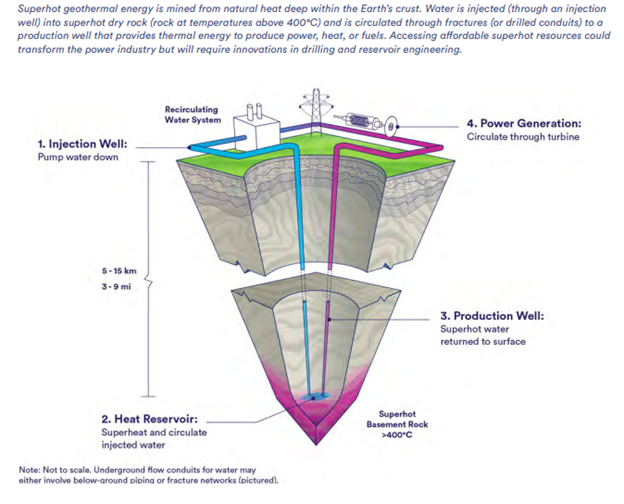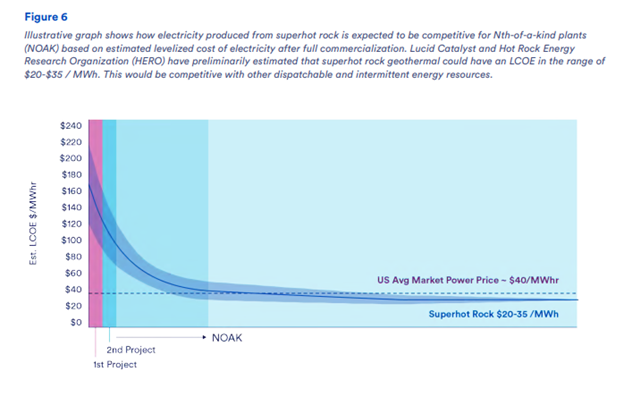One of the hottest new technologies for production of heat and electricity is found deep underground.
With ground-source heat pumps there is a year-round reservoir of constant temperature air just a few meters below the surface. This air is the same as the average temperature above ground. Heat pumps are useful for cooling in the summer and heating in the winter, using highly efficient technology powered by electricity.
But really high-energy heat is found much deeper at more than 10 kilometers below the surface.
So far there are only about 16 gigawatts of power from geothermal power plants as they must be near the surface and thus limited to regions where heat is not too deep, as in the U.S. Great Basin and East Africa. But this is a trivial amount of energy.
If one goes deeper, a lot deeper, there is a very promising source of energy in the form of superhot rocks. Here are two reports that describe how this work
- https://scitechdaily.com/harnessing-hellfire-the-geothermal-breakthrough-set-to-transform-clean-energy/
- https://cdn.catf.us/wp-content/uploads/2022/10/21171446/superhot-rock-energy-report.pdf
The current limit of drilling is about 10 kilometers or six miles below the surface. But if ways to drill to 20 kilometers can be developed there is an unlimited supply of energy available everywhere in the form of “deep superhot rock”.
Over two dozen wells have been drilled into superhot rocks, but depths so far have been limited to 3-7 km in Japan, Italy, Iceland and Mexico.

Source: Clean Air Task Force
One experimental well in Iceland contains enough energy in the form of heat to make about 36 megawatts MW of energy, about five to ten times that of a normal geothermal installation.
Using techniques developed by the fossil fuel drilling industry this rock can be encouraged to heat water to temperatures that will provide steam for generating electricity. At 400 degrees Celsius and above rock under pressure becomes ductile, or gooey, which means that tapping into that heat will be more difficult than fracturing an oil well in much shallower depths.
These very deep wells are expensive to drill. Drilling will require large sums of capital but once the capital expenditure is made, there will be low operating costs. The normal cost of fuel that must be purchased continually for nuclear, coal, natural gas and crude oil operations is not required. But the provider of capital must be confident of a decent return before the project can start. Eventually costs of 20-35 dollars per megawatt hour are expected.

Source: Clean Air Task Force
The deepest well drilled, in the 1970s in Russia, is 12.5 km, but the rock was at much lower temperatures. Existing drilling techniques can be used but they would be expensive as the drill bits must be extracted from the hole to change bits. Imagine pulling several kilometers of drill pipe from the hole!
With technology advancements that are within reach this new source of energy that does not depend on the wind blowing or sun shining could be tapped in the next decade or two providing dependable electricity and heat at a low cost.
Hilliard MacBeth
The opinions expressed in this report are the opinions of the author and readers should not assume they reflect the opinions or recommendations of Richardson Wealth or its affiliates. Assumptions, opinions and estimates constitute the author's judgment as of the date of this material and are subject to change without notice. We do not warrant the completeness or accuracy of this material, and it should not be relied upon as such. Before acting on any recommendation, you should consider whether it is suitable for your particular circumstances and, if necessary, seek professional advice. Past performance is not indicative of future results. The comments contained herein are general in nature and are not intended to be, nor should be construed to be, legal or tax advice to any particular individual. Accordingly, individuals should consult their own legal or tax advisors for advice with respect to the tax consequences to them, having regard to their own particular circumstances.. Richardson Wealth is a member of Canadian Investor Protection Fund. Richardson Wealth is a trademark by its respective owners used under license by Richardson Wealth.